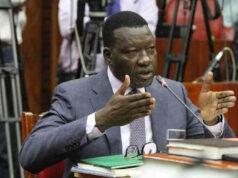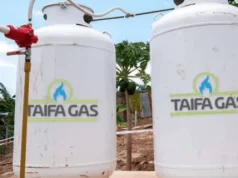
Higher electricity tariffs will push up manufacturers’ cost of electricity by up to 38 per cent, sector lobby now says, leading to costlier goods.
Kenya Power is seeking a tariff review, which is approved by the Energy Petroleum and Regulatory Authority will take effect from April 1.
The power retailer is seeking to increase power bills by an average of 40 per cent.
This is exclusive of charges and levies such as Fuel Energy Cost, Foreign Exchange Rate Fluctuation Adjustment, inflation adjustment (varies annually or bi-annually), Water Levy (WARMA which varies monthly),Value Added Tax (currently at 16%), Rural Electrification Program (REP) Levy among others.
It means the cost of electricity will increase by up to 78 per cent.
According to the Kenya Association of Manufacturers (KAM), this will see manufacturers’ cost of electricity go up by between Sh3.5 and Sh5 per unit, depending on their respective tariff and usage.
This, it says, will roll back the gains made when the cost of power was cut by 15 per cent in 2021, adding it will make Kenya’s manufacturing sector uncompetitive.
The country has one of the highest electricity tariffs compared to other key African exporting countries, currently at average of $0.16 (Sh 20.02) per kilowatt hour.
This is about seven times costlier than that of South Africa and Egypt of an average $0.03 per kwh(ShSh3.75). However power supply in South Africa is characterised by rationing.
Morocco and Ethiopia has tariffs averaging $0.05 (Sh6.26) while Tanzania is at $0.08(Sh10.01).
“Tariff review that pushes up the cost of electricity will drive production cost even higher for local industries, rendering the manufacturing sector uncompetitive,” KAM chairman Rajan Shah said in a statement yesterday.
Manufacturers have over time raised concerns over the high cost of electricity in the country, that impacts on the overall cost of production.
The high cost has been attributed to various factors including expensive Purchase Power Agreements (PPAs), high cost of fuel, multiple taxes and levies imposed on electricity bills, forex, VAT and Fuel Cost Adjustment, as well as depressed demand growth – despite the increased power generation capacity, among others.
Kenya’s competitive positioning on the strength of electricity has been eroded year-on-year, despite investments in renewable energy resources mainly geothermal.
It is impossible for the country to be competitive as an investment destination and therefore industrialise in the absence of affordable, reliable, quality, and sustainable electricity for the manufacturing industry,”Shah said.
The association wants the government to lower electricity costs to below Sh10 per kilowatt hour, make power stable and readily available to industrial users, to promote competitiveness in manufacturing locally and regionally.
The burden of inefficiencies in transmission and distribution should not be borne by customers, manufactures note.
Kenya Power however last week defended the proposed higher tariffs saying they are based on resources required for the sector’s sustainability.
Management said it considered the entire value chain-from power generation, purchase, distribution to retail, hence the new tariffs cover revenues required by all players.
Higher electricity tariffs will push up manufacturers’ cost of electricity by up to 38 per cent, sector lobby now says, leading to costlier goods.
Kenya Power is seeking a tariff review, which is approved by the Energy Petroleum and Regulatory Authority will take effect from April 1.
The power retailer is seeking to increase power bills by an average of 40 per cent.
This is exclusive of charges and levies such as Fuel Energy Cost, Foreign Exchange Rate Fluctuation Adjustment, inflation adjustment (varies annually or bi-annually), Water Levy (WARMA which varies monthly),Value Added Tax (currently at 16%), Rural Electrification Program (REP) Levy among others.
It means the cost of electricity will increase by up to 78 per cent.
According to the Kenya Association of Manufacturers (KAM), this will see manufacturers’ cost of electricity go up by between Sh3.5 and Sh5 per unit, depending on their respective tariff and usage.
This, it says, will roll back the gains made when the cost of power was cut by 15 per cent in 2021, adding it will make Kenya’s manufacturing sector uncompetitive.
The country has one of the highest electricity tariffs compared to other key African exporting countries, currently at average of $0.16 (Sh 20.02) per kilowatt hour.
This is about seven times costlier than that of South Africa and Egypt of an average $0.03 per kwh(ShSh3.75). However power supply in South Africa is characterised by rationing.
Morocco and Ethiopia has tariffs averaging $0.05 (Sh6.26) while Tanzania is at $0.08(Sh10.01).
“Tariff review that pushes up the cost of electricity will drive production cost even higher for local industries, rendering the manufacturing sector uncompetitive,” KAM chairman Rajan Shah said in a statement yesterday.
Manufacturers have over time raised concerns over the high cost of electricity in the country, that impacts on the overall cost of production.
The high cost has been attributed to various factors including expensive Purchase Power Agreements (PPAs), high cost of fuel, multiple taxes and levies imposed on electricity bills, forex, VAT and Fuel Cost Adjustment, as well as depressed demand growth – despite the increased power generation capacity, among others.
Kenya’s competitive positioning on the strength of electricity has been eroded year-on-year, despite investments in renewable energy resources mainly geothermal.
It is impossible for the country to be competitive as an investment destination and therefore industrialise in the absence of affordable, reliable, quality, and sustainable electricity for the manufacturing industry,”Shah said.
The association wants the government to lower electricity costs to below Sh10 per kilowatt hour, make power stable and readily available to industrial users, to promote competitiveness in manufacturing locally and regionally.
The burden of inefficiencies in transmission and distribution should not be borne by customers, manufactures note.
Kenya Power however last week defended the proposed higher tariffs saying they are based on resources required for the sector’s sustainability.
Management said it considered the entire value chain-from power generation, purchase, distribution to retail, hence the new tariffs cover revenues required by all players.










